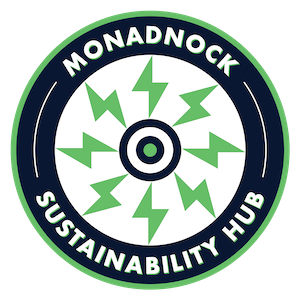By Catherine Koning, Originally Published in The Monadnock Shopper News, Green Monadnock column, January 2025
As we come to the start of a new year, it’s a good time to learn from the ups and downs of climate change impacts and the clean energy transition in 2024.
January 2024 saw record flooding on the NH seacoast resulting from a powerful winter storm, plus high tide and sea level rise. Warmer global temperatures cause ocean waters to expand, increasing the average sea level. Ocean waters in the Northeast US are warming faster than many other parts of the world.
February continued the warm winter, leaving skiers, big-lake skaters and pond hockey players staring at grassy slopes and open water. The temperature never dropped below zero degrees all winter at the National Weather Service’s climate site in Concord.
March saw the announcement that the Connecticut River Conservancy received a grant to remove the Stone Pond Dam from Scott Brook in Fitzwilliam. This will reduce the risks from flooding, help the fish populations move up and down the river, and will help the Monadnock region become more climate resilient!
April featured an amazing Earth Day Fair at the Monadnock Food Co-op. The Monadnock Sustainability Hub hosted its semi-annual Drive Electric show; local electric vehicle owners proudly showed off their powerful, zippy autos to hundreds of visitors. When powered by clean energy, EVs are an important part of the solution to climate change. And the new DC fast charger is now up and running, thanks to a grant we obtained with the Co-op.
May, when the rain stopped, and the dry season began…and NH celebrated Energy Week. Events included an energy career fair, a “button up” weatherization workshop, and a panel discussion on building a resilient energy future in NH communities. Many events were recorded, go to https://nhenergyfuture.org/nhew/
June began the hottest summer on record: The Weather Channel said that more than 2 billion people suffered through 30 or more days of “risky” heat. In the Northern Hemisphere, 180 cities had at least one dangerous extreme heat wave.
July brought good news, as the State of NH announced new funding for cities and towns to install solar panels on their buildings. Installing solar power can allow a municipality to cut carbon emissions and reduce their energy bills.
August arrived with more dry, sunny days, great for picnics but tough on the groundwater supplies. Wildfires burning in Canada sent smoky, unhealthy air into NH. At the same time, electric rates went down in many of the towns with Community Power, even as the percent of renewables in their electric mix went up!
September sent Hurricane Helene, and then Milton, to Florida and the southern Appalachians, bringing extreme amounts of rain that washed away whole towns, killing hundreds of people and causing billions of dollars in property damage. Warmer oceans are fueling more powerful hurricanes.
October saw the unveiling of the Monadnock Sustainability Hub Home Energy Coaching pilot project in Peterborough, to be extended into Harrisville in January 2025. Volunteer coaches will assist homeowners in electrifying their home with clean energy. This is part of a larger initiative, Electrify Monadnock, which will include a public campaign for heat pump installation and home weatherization, bringing householders together with qualified contractors.
November brought in clean electricity from the newly installed, largest solar array in NH! With over 11,000 photovoltaic panels, it is rated at 4.9 megawatts, enough to power about 5000 homes. Clean Energy NH worked with electric utility Unitil to make this clean energy project a reality.
December is upon us now, and scientists have confirmed that the global average temperature has passed the 1.5° C (2.7° F) warming above pre-industrial temperatures, which was the goal set by the Paris agreement. Beyond this level of warming, wildlife and human life as we know it are endangered. 2024 has been confirmed as the warmest year in recorded human history.
Climate change is real, and it’s happening now. There’s so much you can do to help! Support laws to reduce burning of fossil fuels and help make the transition to clean energy. Get involved with your local energy committee or other groups, such as the Monadnock Sustainability Hub. Time is short, we have to move fast!
Catherine Owen Koning is a Professor of Environmental Science at Franklin Pierce University, where she co-coordinates the Institute for Climate Action. She is also a member of the Monadnock Sustainability Hub’s Board of Directors and co-
chairs the Keene Clean Energy Team.
